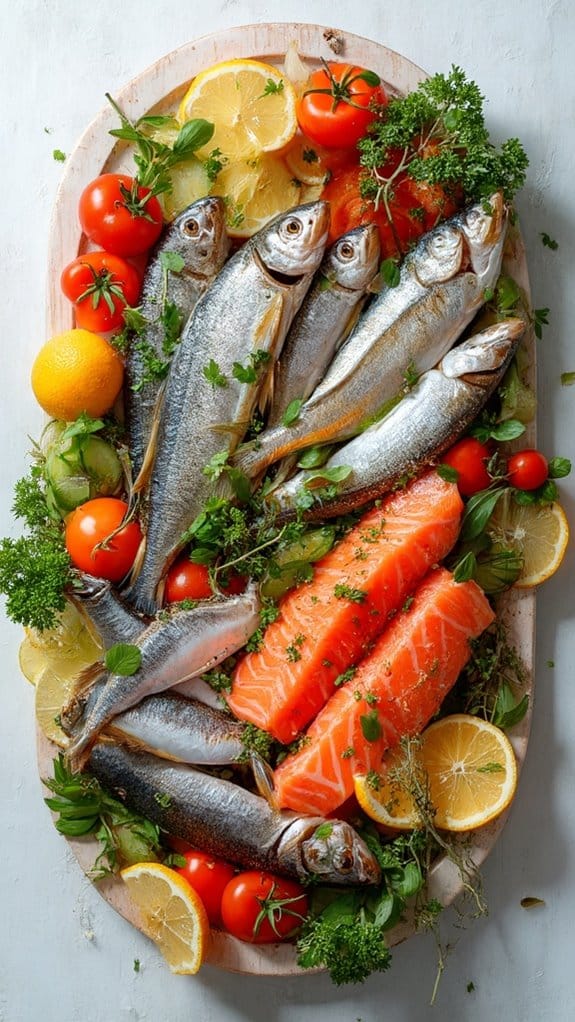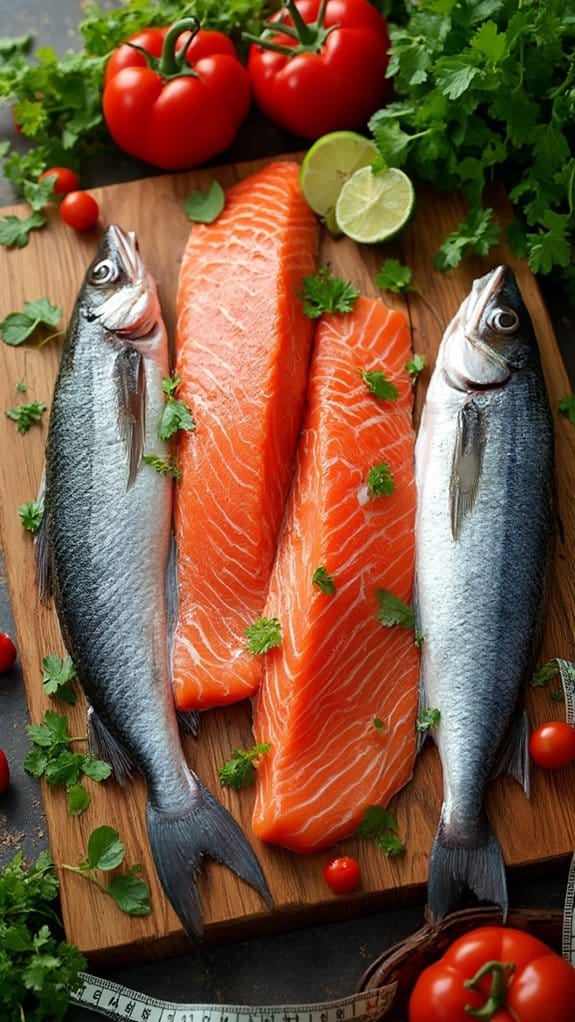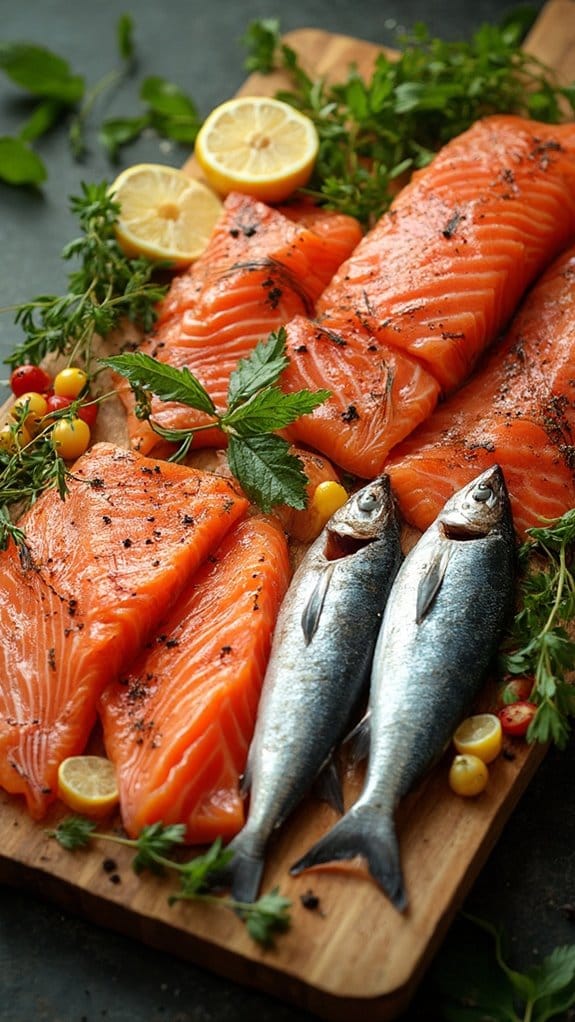No products in the cart.

The Nutritional Benefits of Eating Fish: A Guide to Healthy Choices for the New Year
Eating fish is a fantastic way to boost your health this New Year! With high protein content and low levels of saturated fat, fish supports muscle growth while keeping your heart happy. It’s loaded with omega-3 fatty acids that help your brain function better and might even lift your mood. Plus, regularly munching on fish can reduce the risk of chronic diseases like heart disease and strokes. Isn’t it time to give your meals a healthy twist? Incorporating tasty options like salmon or sardines into your diet can be easy and fun, especially with some clever meal ideas waiting for you!
Contents
hide
Key Takeaways
- Fish is rich in omega-3 fatty acids, essential for brain function and reducing the risk of cognitive decline.
- Consuming fish twice a week can significantly lower the risk of cardiovascular diseases and improve heart health.
- Fish provides high-quality protein, supporting muscle repair and growth with minimal saturated fat compared to red meats.
- Regular fish consumption is linked to improved mood and alleviation of symptoms associated with ADHD and depression.
- Healthy cooking methods like grilling or baking preserve nutrients, making fish a nutritious addition to your diet.
Health Benefits of Fish

Eating fish offers numerous health benefits that can greatly enhance your overall well-being. Have you ever thought about how a simple meal could protect your heart and boost your brainpower? Incorporating different fish varieties into your diet can lower blood pressure, improve blood vessel elasticity, and even raise those ‘good’ cholesterol levels.
Plus, it’s a tasty way to reduce your risk of heart disease and ischemic stroke—sounds like a win-win, right?
But it doesn’t stop there. Fish is rich in omega-3 fatty acids, essential for healthy brain function. These little wonders help combat depression and ADHD while supporting cognitive function. Imagine fighting off brain shrinkage as you age, all while enjoying a delicious salmon or mackerel dish! Eating fish also provides vital minerals like calcium and zinc, which are important for maintaining overall health. Additionally, consuming fish can provide 250-500mg of omega-3 daily, which is crucial for heart health. Incorporating fish dishes into your meals can also enhance flavor while providing necessary nutrients.
Let’s not forget about your immune system. Eating fish, especially when sourced through sustainable fishing practices, provides crucial nutrients like vitamin D that can reduce inflammation and help fend off autoimmune diseases.
Nutritional Content Overview

A well-rounded diet benefits greatly from including fish, which boasts a remarkable nutritional profile. You might be surprised by just how packed with nutrients fish can be! It’s not just about the taste; it’s about the protein sources and vitamin benefits that can elevate your health.
Here’s a quick snapshot of what fish brings to the table:
- High in Protein: Most fish contain 18–20% protein, making them excellent choices for muscle repair and growth.
- Rich in Healthy Fats: Fish fats, primarily polyunsaturated fatty acids (PUFAs), aid in absorbing essential vitamins.
- Vitamins Galore: Fatty fish are particularly high in vitamins A and D, essential for vision, bone growth, and overall wellness. Additionally, fish are an excellent source of complete proteins that provide all essential amino acids needed for optimal health.
- Mineral Powerhouse: Fish is loaded with minerals like calcium, iron, and zinc, all important for various bodily functions. Additionally, increased access to fish can help mitigate malnutrition and food insecurity in vulnerable populations.
Think about it: a 3oz serving of tuna packs a whopping 26g of protein! Whether it’s salmon, trout, or mussels, you’re treating your body to a feast of nutrients.
Plus, the fats in fish help your body absorb vitamins K, D, A, and E effectively. If you’re seeking a delicious way to boost your protein intake while enjoying the numerous health perks, fish is definitely a smart choice.
Top Omega-3 Rich Fish

Including fish in your diet not only boosts your protein intake but also provides a rich source of omega-3 fatty acids, which are essential for heart and brain health. Regular intake of omega-3s can help reduce inflammation and support overall cardiovascular health. Fish is also an excellent source of essential vitamins and minerals, making it a nutritious addition to any meal.
So, which fish varieties should you consider to load up on these beneficial omega-3 sources? Let’s explore some top contenders!
First up, Atlantic herring packs in 1.71 grams of omega-3 per serving. It’s not just delicious when grilled or pickled; it’s also low in mercury, making it a safe choice.
Then there’s farmed Atlantic salmon, with 1.83 grams per serving. You can bake, sauté, or poach it, and it’s bursting with protein and vitamins!
If you prefer something a little different, mackerel offers 1.02 grams of omega-3 and can be enjoyed smoked or fresh.
Don’t forget about sardines! They’re usually found in cans, providing 0.83 grams of omega-3 and are rich in vitamin D.
For a milder flavor, try rainbow trout, which has 0.84 grams of omega-3 and is great for those who shy away from stronger fish.
And who can resist anchovies? These little guys offer 1.23 grams per serving and can jazz up your pizza or salads.
With so many omega-3 rich fish to choose from, you can easily incorporate these tasty options into your meals.
Heart Health Advantages

Numerous studies show that consuming fish can greatly enhance heart health. If you’re looking to give your cardiovascular system a boost, adding more fish to your meals might just be the ticket. The omega-3 fatty acids in fish are like superheroes for your heart, working tirelessly to fend off heart disease and provide cardiovascular protection.
Consider this:
- Eating at least two servings of fish each week can markedly lower your risk of major cardiovascular disease.
- Those delicious fatty fish, like salmon and mackerel, can reduce triglyceride levels and help maintain healthy blood pressure.
- Regular fish consumption is linked to a reduced risk of strokes and heart attacks, making your heart feel a whole lot safer. Additionally, consuming non-fried fish as part of a balanced diet can significantly improve your overall heart health.
- A Mediterranean diet, rich in fish, isn’t only tasty but also a fantastic way to support your heart health. Additionally, incorporating fish into your diet can lead to a lower heart disease mortality risk.
Now, who wouldn’t want to lower their risk of heart disease while enjoying a meal? It’s a win-win!
Imagine savoring a beautifully grilled piece of fish, knowing it’s doing wonders for your health. So, why not take a leap into the world of fish? You’ll not only be treating your taste buds but also giving your heart the care it deserves.
Eating fish isn’t just a meal; it’s a choice for a longer, healthier life. Why wait? Jump in!
Brain and Cognitive Perks

Fish’s brain-boosting benefits are impressive, making it an essential part of your diet if you want to support cognitive health. If you eat fish at least twice a week, you’re not just enjoying a delicious meal; you’re also protecting your brain.
Fatty fish, rich in omega-3 fatty acids like DHA and EPA, plays a significant role in memory enhancement and cognitive resilience. Studies show that higher consumption of these fish can reduce the risk of cognitive decline, Alzheimer’s, and even mild cognitive impairment. Additionally, regular fish consumption is linked to lower risks of dementia progression, underscoring its protective effects on the brain. Research indicates that a daily intake of 250-500 mg of combined EPA and DHA can further enhance cognitive function and brain health.
Imagine this: the more omega-3s you consume, the larger your hippocampus may grow, leading to better abstract reasoning and logical thinking. It’s like giving your brain a workout! DHA is particularly important, not just for adults, but also for children’s brain development.
By including fish in your meals, you might notice a boost in your ability to think clearly and process information faster.
And it doesn’t stop there. Regularly eating fish can even help reduce symptoms of ADHD and depression, making you feel lighter and more focused.
So, why not embrace the freedom of choice that comes with a healthy diet? Whether you prefer salmon, sardines, or mackerel, you’re making a smart move for your brain’s wellbeing.
Tips for Incorporating Fish

Incorporating fish into your diet can be both simple and enjoyable. With just a few meal ideas and cooking techniques, you can add delicious and nutritious seafood to your weekly routine. So, why not take the plunge and explore the many ways to enjoy fish? Here are some tips to get you started:
- Toss tinned tuna or salmon into salads or sandwiches for a quick, protein-packed snack.
- Try seafood marinara in your favorite pasta dishes or stir-fries for a zesty twist.
- Swap out meat for fish in your go-to recipes—think tacos or curries!
- Start your day with scrambled eggs and smoked salmon on a bagel for a satisfying breakfast.
When it comes to cooking, healthier methods like grilling, baking, or steaming keep the flavors vibrant without the added calories. Using a splash of olive oil can elevate your dish without the guilt.
Remember to cook your fish until it flakes easily with a fork, usually around 145 degrees F.
To make meal planning seamless, aim for 2-3 servings of fish each week. Keep an eye on local specials or stock up on canned seafood for those busy nights.
With these tips, you’ll not only enjoy the taste of fish but also embrace its nutritional benefits, making every meal a little healthier and a lot more exciting. So, why not jump in? Your taste buds will thank you!
Frequently Asked Questions
How Often Should I Eat Fish for Optimal Health Benefits?
So, how often should you eat fish? For ideal health benefits, aim for two to three servings a week, focusing on a variety of fish.
Ever tried salmon, mackerel, or sardines? Mixing it up not only keeps meals interesting but also maximizes your nutrient intake while minimizing contaminants.
Just remember, it’s not about eating fish every day; it’s about enjoying those delicious fish varieties in moderation for a healthier you!
Are There Any Risks Associated With Eating Fish?
Sure, eating fish can be delicious and nutritious, but you need to be aware of potential risks.
Mercury exposure is a big concern, especially for pregnant women and children. Plus, sustainability concerns arise when considering overfishing and environmental impacts.
So, how often should you indulge in your seafood cravings? Balancing enjoyment and safety is key.
What Types of Fish Should I Avoid?
When it comes to fish, some choices can feel like swimming in shark-infested waters.
You’ll want to steer clear of high-mercury options like swordfish and shark, which can pose serious health risks.
Also, avoid farmed fish like salmon and tilapia; they often come packed with contaminants and unhealthy fats.
Can I Get Omega-3s From Fish Alternatives?
Absolutely, you can get omega-3s from fish alternatives!
Plant-based sources like walnuts, flaxseed, and chia seeds are fantastic options. Plus, many fortified products, such as plant-based milk and yogurt, offer added omega-3s derived from microalgae.
Isn’t it great that you can enjoy these tasty alternatives while still reaping the nutritional benefits?
How Should I Store Fish to Maintain Freshness?
To keep your fish fresh, you’ve got to master some smart storage techniques.
After catching or buying it, ice it right away! Consider using freezing techniques like vacuum sealing in air-tight bags to lock in flavor.
For shorter-term storage, wrap it in waxed paper or aluminum foil before refrigerating.
Remember, fish can spoil quickly, so don’t wait too long.
Isn’t it worth the effort to enjoy delicious, fresh fish?
Conclusion
Eating fish can be like giving your body a high-five—it’s a tasty way to boost your health! With all those omega-3s, you’re supporting your heart and brain while enjoying delicious meals. So, why not make fish a regular part of your diet this year? It’s a simple change that can lead to big benefits. Immerse yourself in the world of seafood, and you might just find a new favorite dish waiting for you!

